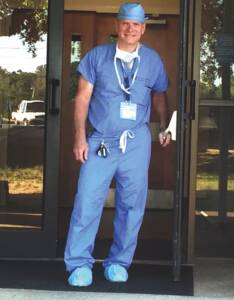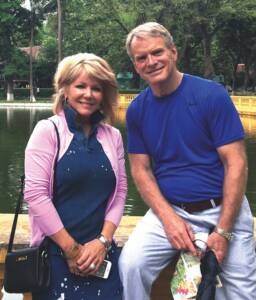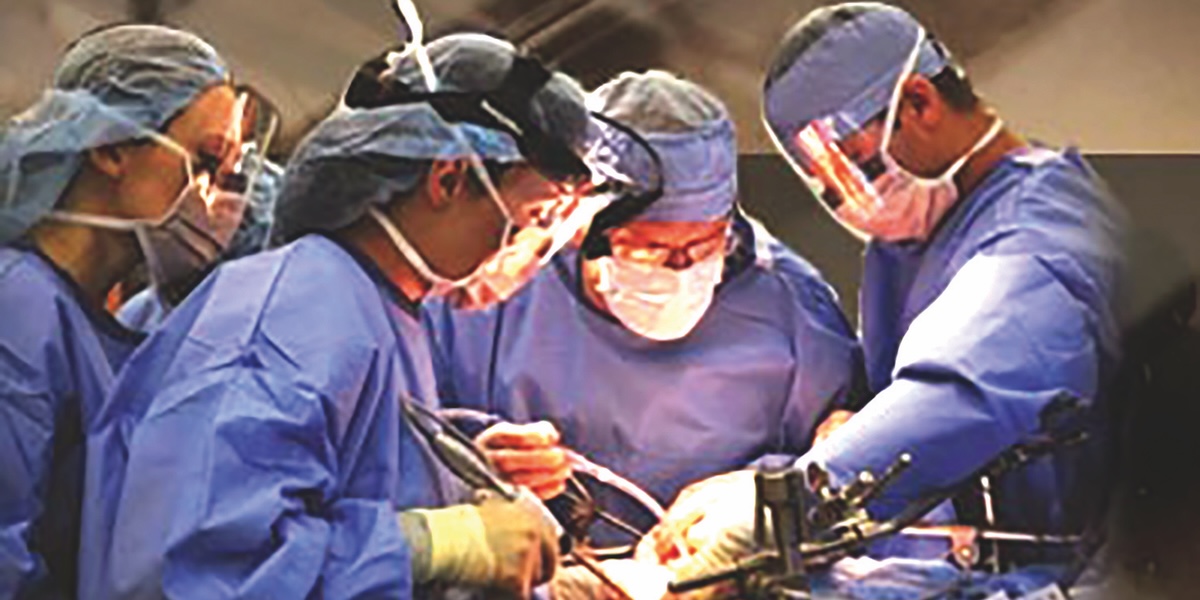The Art of Surgery and the Privilege of Mentoring:
STRIVE TO BE MEN FOR OTHERS
By Lori Roberts
For over half a century, Dr. Thomas Helling Kansas ’66 has wielded the surgeon’s scalpel. But his perspective extends far beyond the operating room. Add a decade serving in the U.S. Army, and it’s no surprise that Helling has authored several books exploring the history of medicine in military combat zones.
Helling, 77, also has a rich family history with the Phi Kappa Psi brotherhood. He’s a dad and a grandfather of Kansas Alpha legacies: his son, Thomas Helling Jr. Kansas ’92, and grandson, Jack Young Kansas ’19.
Helling credits the Fraternity with keeping him grounded as an undergraduate.
“I liked the guys there,” he said. “I thought it was a good place for young freshmen to be sort of isolated from some of the weird stuff that happens on college campuses. We had strict rules for studying. You knew you were going to be OK.”
Ask him about his medical career, though, and he’ll take you on a trip that starts in Kansas City, discovers a passion for teaching and continues to this day as a part-time surgeon with the University of Mississippi Medical Center in Jackson, Mississippi.
A Medical Prescription
There’s no dramatic story behind Helling’s decades in medicine, no childhood epiphany of wanting to cure the incurable. His entry was a fortunate detour. His brother’s aspiration to become a doctor sounded interesting to a young Helling, a spark that illuminated his path.
“It just gelled with me,” Helling recalled. “I don’t think it was something spiritual. It seemed to be a fun activity that was intellectually challenging.”
After graduating from Rockhurst High School in Kansas City, Helling attended the University of Kansas for undergrad and medical school. His training took him to Denver for surgical and back to Kansas City to set up a practice and become a faculty member at the University of Missouri Kansas City School of Medicine. After a stint in Pennsylvania, he landed at the University of Mississippi Medical Center, where he served as head of general surgery and director of the surgery residency program.
Along the way, Helling married and had twins. He remarried in 2001 and gained a stepdaughter with his wife, Kelly.
Two passions define his medical career: the art of surgery and the privilege of mentoring young physicians.
 “I think surgeons actually share a more intimate relationship with their patients than other specialties,” Helling said. “You’re opening the skin and diving into those areas that have been labeled the soul, mind and spirit. We’re not a standoffish, aloof kind of physician. We are mechanics in a way, but that doesn’t mean that we disregard the human being. The human being isn’t just a machine.”
“I think surgeons actually share a more intimate relationship with their patients than other specialties,” Helling said. “You’re opening the skin and diving into those areas that have been labeled the soul, mind and spirit. We’re not a standoffish, aloof kind of physician. We are mechanics in a way, but that doesn’t mean that we disregard the human being. The human being isn’t just a machine.”
A lifelong practicing Catholic, he said one of his motivations for pursuing medicine was to understand death. Fifty years later, he admitted his work has only deepened the mystery. Despite the miseries he has witnessed, his faith and his religion have held strong.
“I’ve developed compassion for those who suffer,” Helling said.
“It’s not a religious thing — it’s shared humanity and the shared experience of life.”
Writing the Story of Medicine and Military
Helling’s education timeline meant he missed the Vietnam War draft. But Army recruiters kept calling. When the Gulf War broke out in 1991, he joined the Army Medical Corps. The conflict was winding down, but he felt a duty to serve after receiving educational deferments. He spent time at military schools and Army medical centers before his honorable discharge in 2000 as a lieutenant colonel.
“I’m very proud of that service. I think it was an insightful experience,” Helling said.
As a physician and surgeon, Helling has authored or co-authored more than 100 medical publications. A paper on a military surgery topic evolved into a deeper project. After diving into research at the National Archives and talking to Army historians, he published his first book, “Desperate Surgery in the Pacific War: Doctors and Damage Control for American Wounded, 1941-1945.” Three more followed, exploring medicine in the Civil War, World War I and later conflicts in the 20th century.
 His books touch on the challenges of battlefield medicine, from the Civil War, where soldiers died from camp sickness as well as battle wounds, to the World Wars, where surgeons and physicians understood the importance of timely medical care on the battlefield. Weapons were evolving, but so was military medicine, adding blood transfusions, radiology and mobile surgical ships.
His books touch on the challenges of battlefield medicine, from the Civil War, where soldiers died from camp sickness as well as battle wounds, to the World Wars, where surgeons and physicians understood the importance of timely medical care on the battlefield. Weapons were evolving, but so was military medicine, adding blood transfusions, radiology and mobile surgical ships.
“Our soldiers, sailors and airmen and women deserve the best care possible,” Helling said. “How early can you get that patient to surgeons, and how quickly can you get them taken care of?”
His latest book touches more on the spiritual. “The Healers: Physicians, Spiritualists and Shamans in the Search for Holistic Health” takes a closer look at the history of addressing the body’s physical and the spiritual ailments. Helling has seen a similar evolution in his own career.
“I’ve become more compassionate and more concerned about what I’m putting people through,” Helling said. “Obviously, there are some cases where surgery is pretty clear cut. Acute appendicitis, cancer, you have to do something. But, there are other conditions that are more elective, and you begin to appreciate that surgery damages the body, and in some cases you may never recover. What will surgery do to them? Will they be better overall or worse?”
He aims to impart this wisdom to the next generation of doctors.
Helling certainly isn’t spending his days hanging out in a recliner with his remote control in his hand. Being an author has its challenges, he said. Writing a book is one thing; selling the book is another. But he probably has a few more books in him.
“Of course I do, but they’re probably like little eggs in an ovary,” Helling said. “They’re probably waiting to get fertilized.”
THOMAS HELLING, IN HIS OWN WORDS
Dr. Thomas Helling’s career as a physician, healer and author has given him insights as only real-life experiences can. We wanted to share a few that didn’t make it into his story.
On pledging Phi Kappa Psi:
“You always remember your pledge training with all the hassling. I thought it was all tongue-in-cheek, but they wanted you to feel special in the end. You wanted to feel like you’ve been through something. As long as you made your grades and you weren’t a complete dork, it was something you could be proud of.”
On medical breakthroughs:
“The biggest major surgical advance I’ve seen is laparoscopic surgery. One of the most common operations in this country is gallbladder surgery. Laparoscopic surgery has changed that from a larger incision requiring three or four days in the hospital to an outpatient operation. You can talk about liver transplants and heart transplants and other types of exotic surgeries, but you’re talking about only a small number of patients. The most impact is the one that affects the largest number of patients.”
On living in the Midwest:
“I like the fact that there’s a good work ethic here. The people I train are hardworking men and women. They are in no way aspiring to climb any academic ladder or climb over anybody’s back to succeed. They are just basic hardworking people. They want to serve their community. I think that’s the major attraction of Midwest living. I think we produce fine, grounded individuals who have a desire to be a good neighbor and be of service, to care about people in need. Like they told us at Rockhurst High School, ‘Strive to be men for others.’”
Do you have a medical career or work in healthcare? Let us know: marketing@phikappapsi.com


